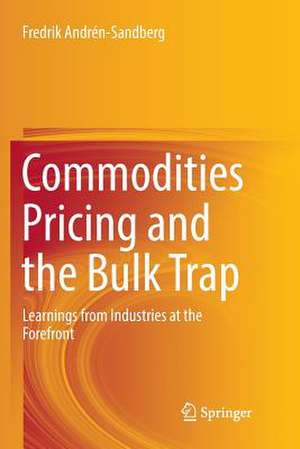Commodities Pricing and the Bulk Trap: Learnings from Industries at the Forefront
Autor Fredrik Andrén-Sandbergen Limba Engleză Paperback – 6 iun 2019
This framework is then utilised in the following chapters as a model to explain the progression of decommoditisation, and to examine other sectors through this lens. To conclude, the book presents the implications for stakeholders and suggestions on how to respond to them from a policy and business standpoint. In a final chapter the book develops an outlook on current trends and possible alternative pathways, and summarizes the main takeaways for management professionals and policymakers alike.
| Toate formatele și edițiile | Preț | Express |
|---|---|---|
| Paperback (1) | 380.25 lei 6-8 săpt. | |
| Springer International Publishing – 6 iun 2019 | 380.25 lei 6-8 săpt. | |
| Hardback (1) | 387.38 lei 6-8 săpt. | |
| Springer International Publishing – 18 ian 2018 | 387.38 lei 6-8 săpt. |
Preț: 380.25 lei
Nou
Puncte Express: 570
Preț estimativ în valută:
72.76€ • 79.28$ • 61.31£
72.76€ • 79.28$ • 61.31£
Carte tipărită la comandă
Livrare economică 23 aprilie-07 mai
Preluare comenzi: 021 569.72.76
Specificații
ISBN-13: 9783319891842
ISBN-10: 3319891847
Pagini: 142
Ilustrații: XIII, 142 p. 33 illus., 29 illus. in color.
Dimensiuni: 155 x 235 mm
Greutate: 0.23 kg
Ediția:Softcover reprint of the original 1st ed. 2018
Editura: Springer International Publishing
Colecția Springer
Locul publicării:Cham, Switzerland
ISBN-10: 3319891847
Pagini: 142
Ilustrații: XIII, 142 p. 33 illus., 29 illus. in color.
Dimensiuni: 155 x 235 mm
Greutate: 0.23 kg
Ediția:Softcover reprint of the original 1st ed. 2018
Editura: Springer International Publishing
Colecția Springer
Locul publicării:Cham, Switzerland
Cuprins
Introduction.- Introduction to commodities.- The unlikely seeds of commoditisation reversal.- Break in the commoditisation trend - Information proliferation.- The energy market revolution - A canary in the coal mine.- Learnings from the energy market decommoditisation process.- Parallel decommoditisation trends in non-energy markets.- Commodities next in line for decommoditisation.- How could countries reap the benefits of the decommoditisation trend.- How businesses can become winners of the decommoditisation trend.- Possible decommoditisation detailers.- The opportunities for a better tomorrow.- Epilogue and further reading.
Notă biografică
With an academic background in Economic History (Msc) and Nanoscience Engineering (Msc), Fredrik Andrén-Sandberg has been working several years in the European energy industry across both the conventional and renewable spectrum. While working with the European and Asian markets in various positions ranging from Business Development and Strategy to Regulatory Affairs - he has witnessed and has been part of driving the renewable energy transformation first hand. He is currently living outside of Lund in Southern Sweden, but is working with wind power in Copenhagen, Denmark.
Textul de pe ultima copertă
This book takes a fresh look at pricing, product differentiation and the need for decommoditisation in market sectors where products and services are standardised and interchangeable. In the first chapters the book explains what commodities are, and puts them into a historical perspective to promote an understanding of their production and its effects. From this baseline the book then presents a case study on how decommoditisation has progressed within the energy industry. Building on this case study and learnings from other sectors, it develops a theoretical framework, characterising the processes and mechanisms observed to be extended towards different industries.
This framework is then utilised in the following chapters as a model to explain the progression of decommoditisation, and to examine other sectors through this lens. To conclude, the book presents the implications for stakeholders and suggestions on how to respond to them from a policy and business standpoint. In a final chapter the book develops an outlook on current trends and possible alternative pathways, and summarizes the main takeaways for management professionals and policymakers alike.
Caracteristici
Presents key lessons learned on pricing and product differentiation for commodities Develops a framework for decommoditization that can be applied to various sectors Includes an extended case study on decommoditization in the energy industry
